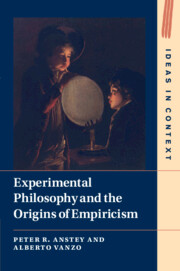Book contents
- Experimental Philosophy and the Origins of Empiricism
- Ideas In Context
- Experimental Philosophy and the Origins of Empiricism
- Copyright page
- Contents
- Figures
- Tables
- Acknowledgements
- A Note on Citations
- Abbreviations
- Introduction
- Part I The Rise of Experimental Philosophy
- Chapter 1 The Origins of the Experimental/Speculative Distinction
- Chapter 2 Experimental Philosophy in the Seventeenth Century
- Chapter 3 Experimental Natural History
- Part II The Heyday of Experimental Philosophy
- Part III From Experimental Philosophy to Empiricism
- Conclusion
- Manuscripts Cited
- Newspapers, Broadsheets, and Almanacs
- References
- Index
Chapter 2 - Experimental Philosophy in the Seventeenth Century
from Part I - The Rise of Experimental Philosophy
Published online by Cambridge University Press: 17 February 2023
- Experimental Philosophy and the Origins of Empiricism
- Ideas In Context
- Experimental Philosophy and the Origins of Empiricism
- Copyright page
- Contents
- Figures
- Tables
- Acknowledgements
- A Note on Citations
- Abbreviations
- Introduction
- Part I The Rise of Experimental Philosophy
- Chapter 1 The Origins of the Experimental/Speculative Distinction
- Chapter 2 Experimental Philosophy in the Seventeenth Century
- Chapter 3 Experimental Natural History
- Part II The Heyday of Experimental Philosophy
- Part III From Experimental Philosophy to Empiricism
- Conclusion
- Manuscripts Cited
- Newspapers, Broadsheets, and Almanacs
- References
- Index
Summary
This chapter traces the emergence of experimental philosophy in England from the late 1650s in the precursor groups to the Royal Society and, in particular, in the natural philosophical method of Robert Boyle. It provides a detailed examination of the development of Boyle’s experimental philosophy and an overview of the adoption of experimental philosophy by many virtuosi in the fledgling Royal Society. From there it turns to early opposition to experimental philosophy by the likes of Meric Causabon and Margaret Cavendish, and the application of the methodology in English medicine, particularly amongst the chymical physicians. The next sections of the chapter examine the spread of experimental philosophy to the Continent and its impact on religion. The new approach to natural philosophy was said to have a positive effect on those who practise it, and its principles were soon applied in both natural religion and Christian apologetics. Finally, we turn to the questions of the shifting speculative targets of the experimental philosophers, pointing out that Descartes’ vortex theory came in for particularly harsh criticism, and the conceptual question as to who qualifies as an experimental philosopher.
Keywords
- Type
- Chapter
- Information
- Experimental Philosophy and the Origins of Empiricism , pp. 43 - 74Publisher: Cambridge University PressPrint publication year: 2023

